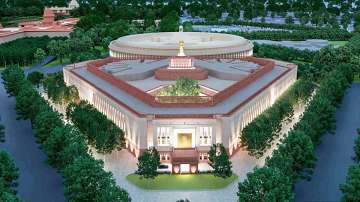New Parliament building row: Supreme Court rejects PIL seeking direction on inauguration by President Murmu
Amid row over the new parliament building, the Supreme Court rejected the Public Interest Litigation (PIL) over the inauguration of the facility scheduled to take place on May 28.

Parliament new building row: Amid the ongoing furore over the new Parliament building, the Supreme Court on Friday rejected the Public Interest Litigation (PIL seeking a direction that the facility should be inaugurated by the President of India Droupadi Murmu. Hearing the matter, the top court reprimanded the petitioner, saying entertaining such matters is not its job.
"Why the petitioner should not be fined for filing the PIL on this kind of matter," the apex court asked. Earlier on Thursday, May 25, a PIL was filed in the top court regarding the inauguration of the new Parliament building which is set to take place on May 28.
What PIL contended?
The PIL contended that Lok Sabha Secretariat violated the Constitution by not inviting the President for the inauguration. The statement issued by the Lok Sabha Secretariat on May 18, and invites issued by the Secretary-General, Lok Sabha, about the inauguration of the new Parliament building, is in violation of the Indian Constitution, the PIL filed by advocate Jaya Sukin said.
"The Prime Minister is appointed by the President and other ministers are appointed by the President on the advice of the Prime Minister. The President of India is authorised to appoint constitutional functionaries such as Governors, Judges of both the Supreme Court and high court, Comptroller and Auditor General of India, chairman and manager of the Union Public Service Commissioner, Chief Election Commissioner, Financial Commissioner, and other Election commissioners," the PIL said.
ALSO READ: New Parliament Opening: Who are in support and who are boycotting May 28 ceremony
Who are parties to the case?
The Lok Sabha Secretariat, Union Ministry of Home Affairs, and Ministry of Law and Justice are parties in the case. It stated, "Respondent's (Secretary and Union) decision is illegal, Arbitrary, high-handed, whimsical and unfair, abuse of authority and against the principles of natural justice."
"Respondents has violated Indian Constitution and Constitution is not being respected. Parliament is the supreme legislative body of India. The Indian Parliament comprises of the President and the two Houses - Rajya Sabha (Council of States) and Lok Sabha (House of the People). The President has the power to summon and prorogue either House of Parliament or to dissolve Lok Sabha," it added.
A total of 21 opposition parties, including the Congress, TMC and AAP have announced a boycott of the inauguration of the new Parliament building. They have said that Prime Minister Narendra Modi's decision to inaugurate the building without President Droupadi Murmu "insults the high office of the President, and violates the letter and spirit of the Constitution".
About the new Parliament building
It should be mentioned here that the ceremony to inaugurate the new Parliament building will begin with an early morning havan and a multi-religion prayer on Sunday (May 28) followed by a formal opening in the Lok Sabha chamber.
The triangular-shaped four-storey Parliament building has a built-up area of 64,500 sq m. The building has three main gates -- Gyan Dwar, Shakti Dwar, and Karma Dwar. The present building of the Parliament was completed in 1927, and is now 96 years old. Over the years, the old building was found to be inadequate for present day requirements.
The new Parliament building, constructed by Tata Projects Ltd, will have a grand constitution hall to showcase India's democratic heritage, a lounge for members of Parliament, a library, multiple committee rooms, dining areas and ample parking space. The existing building served as independent India's first Parliament and witnessed the adoption of the Constitution.
(With inputs from agencies)